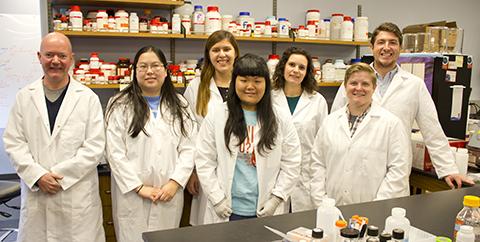
A research team at The University of Texas at Austin College of Pharmacy is turning up the heat in its efforts to understand and ultimately block production of cancer cells.
Dr. Ted Mills, associate professor of pharmacology and toxicology, and members of his research team have expanded the target list and discovered a method to block an energy pathway needed by cancer cells to reproduce.
Mills said the research was inspired by studies conducted over eight decades ago by Otto Warburg concerning reproduction of cancer cells. Warburg’s studies, Mills explains, focused on cancer cells’ dependence upon sugars to create the energy needed for cell replication. Mills team found that the cells also exhibit an insatiable appetite for fats that are also used to generate tumors. He and his team have devised an approach that impedes the conversion of both sugars and fats, forcing the energy to be released as heat.
In developing their attack strategy, the team focused on a small family of proteins within the cell known as uncoupling proteins, in particular UCP3. The lab first found the energy wasting mechanism of UCP3 as the molecular basis for lethal hyperthermia induced by the amphetamine drug Ecstasy. That work was published in a 1993 edition of Nature.
Building upon the 1993 findings, and bridging interest in both toxicology and cancer biology, the Mills team set about to determine if this same energy wasting process might be applied to cancer cells to disrupt the cells’ production of daughter cells. They found that the same nutrient wasting mechanism disrupts cancer development by breaking down the nutrients and releasing them as heat, and, for the first time, they expanded the technique to include fats as well as sugars. The work was published in a fall 2015 edition of Nature Communications.
Mills said that team members had hypothesized that the occurrence of cancer would be reduced after UCP3 exposure, but they were surprised to discover that none of the test subjects that genetically engineered to have increased UCP3 developed malignant tumors. Analysis of skin tumor development showed that those with increased UCP3 levels not only had a complete block of the development of malignant tumors, but also reflected a large-scale breakdown of fats and glucose. In essence, the sweet tooth and fat cravings were still present, but UCP3 interrupted the metabolism process via the heat release.
The team discovered that the increased fat metabolism occurring in the epidermal cells blocked development of cancer by suppressing activation of the oncoprotein kinase b/AKT, a major driver of cancer growth. Blocking the UCP3 driven fat breakdown restored AKT activation and growth, and restored cancer development.
The findings mark a major step in developing new cancer therapies that target fat-based metabolism and heat release. Mills said that the findings have implications for dietary modulations for cancer patients, but hold greater promise in the development of small molecule treatments to specifically increase fat metabolism and nutrient wasting pharmcologically. The work is expected to lay the foundation for development of small molecule activators of UCP proteins as novel anti-cancer agents.
“A researcher goes about his work because he is intrigued to know more about nature,” Mills said. “Somewhere in the process, he hopes that something he finds might prove to be of some value to society. We are thrilled that our hypothesis has proven correct.”

